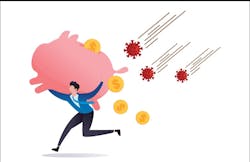Designated as an “Essential Business” or not, this is a difficult time for automotive service businesses. It’s almost impossible to market automotive repair, service or maintenance when the majority of your clients and potential customers are sequestered.
There are, of course, elements of your messaging that can help you remain relevant. Top of mind. But you have to wonder how much they are likely to help when all but a very few of your clients feel comfortable leaving the safety of their homes. Harder yet to imagine they will reach into their pockets for any non-essential services when the economic forecast is dire at best.
It’s hard to compete with the “Safer at Home” messaging that is central to the coronavirus crisis we’re all dealing with. A message that is consistent across two-thirds of our state borders as I write this.
Certainly, we can communicate the steps we’re taking to keep our clients and our team members safe. Like disinfecting contact surfaces, door handles, seats, steering wheels, and controls. Or, the use of plastic steering wheel covers, floor mats, and seat covers.
We can show them we are wearing gloves, masks, and using face shields. Or, remind them our team members are continually washing, sanitizing, and disinfecting the contact surfaces of both their environments and ours.
We can create awareness of the many services we offer safeguarding the integrity of the stay-at-home directives they have received. For example, picking up their vehicles for service and then delivering them safely when service is complete. Or, the ability to complete transactions remotely, online or over the phone. And, we can remind them that productive maintenance will ultimately save them money.
We can go the extra step and provide extraordinary services far beyond anything that was offered before, like picking up and delivering groceries or medications. We can communicate all of these things clearly, concisely, and often.
But the question that will still remain is whether or not our ability or willingness to provide any of these services is really what our clients want or need. The problem is what we may have missed. Perhaps, the most fundamental element of all successful marketing programs. A question that provides its own answer.
“What is it that I can do for you that you are unable or unwilling to do for yourself? What do you need that only I can provide?”
What happens if you decide you aren’t in the business of automotive repair, but shift your business model to provide freedom and mobility as your product instead. What kind of a difference would that difference make?
I would argue the difference is profound. Freedom and mobility are far more compelling as an offering than service, maintenance, or repair, no matter how well done.
Don’t misunderstand. Every one of the services described earlier are essential. Cleaning. Sanitizing. Pickup and delivery. Shopping for groceries. Or, delivering medication.
They are all powerful marketing tools. Especially, in times of crisis, disruption, challenge, and change. But it would be hard to argue that you couldn’t amplify their value if they were offered within the context of ensuring a client’s freedom.
If you aren’t sure, if you remain unconvinced, think about freedom and mobility in terms of your seniors. That segment of your customer base that needs to know that the under-utilized vehicles sitting in their driveway or parked on the street absolutely must get them where they need to go. Particularly in an emergency. Especially, when freedom and mobility translate as independence.
So, while you’re considering all the services the very best shops among us are offering during the pandemic, ask yourself the one critically important question that may yet remain unanswered.
“What can I offer that no one else is offering?”
If it turns out to be freedom and mobility, communicate that to your customer base. Build interest. Create desire. Confirm that you and your team are their best resource. And, then, deliver.
About the Author

Mitch Schneider
Mitch Schneider is a fourth-generation auto repair professional and the former owner of Schneider’s Auto Repair in Simi Valley, Calif. He is an industry educator, seminar facilitator, blogger, and author of the acclaimed novel Misfire.
